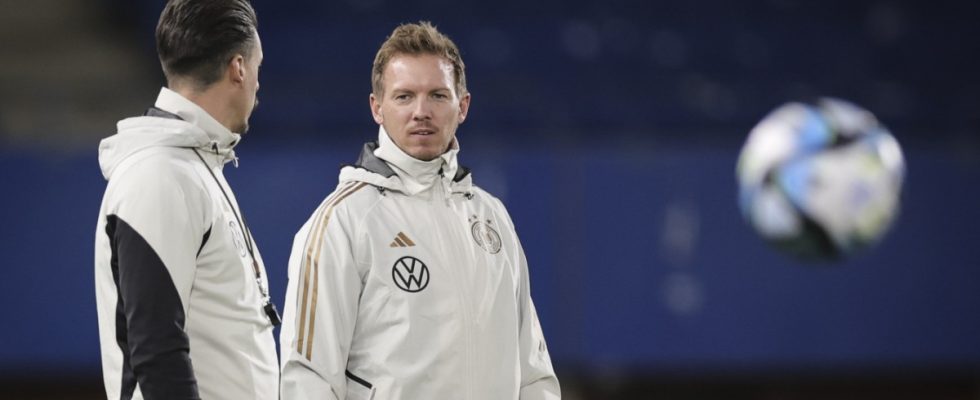The streets of Vienna have been wallpapered for months with a rather involuntary reference to Tuesday evening. “Germany – Austria, 1970-1920” is the title of a fabulous exhibition in the Albertina Modern, the young sister museum of the venerable Albertina on the Opernring in the first district. And because football is also considered a cultural asset in Vienna, the posters have a second meaning: Austria – Germany, 8:45 p.m. – 10:15 p.m., live and in color. Additional time optional. And not to be neglected.
Every minute of the game currently counts in German football, which finds itself in a kind of race against time; the finish line is June 14, 2024, 9 p.m., the opening game of the European Championship. Federal coach Julian Nagelsmann wants to find eleven German football players who will make this home European Championship a success. But with all the complex questions that arise around this football problem, which deal with Kai Havertz as an atypical left-back, Joshua Kimmich in midfield and terms such as asymmetry, tipping and chain formation, one can almost forget: It’s all in this race also about winning over a public that, according to Nagelsmann, should “think very positively about us by June 14th at the latest.”
In order to achieve this, Nagelsmann tried to be honest on the tactics board in his mind’s eye after the 2-3 defeat against Turkey. The tabloid channel RTL, of all places, hailed complex sentences in defense of the defense, which – in short – had not done the matter as badly as some critics thought. In general, this applied to the entire team that lost in Berlin – he continued this line on Monday afternoon in Vienna.
If you ask yourself all the questions, you lose the race against time, says Nagelsmann
Nagelsmann only read one article (“Thank God”), which apparently dealt with the case of the new left-back Kai Havertz, who is not one, but is suitable as a case study: “Kai didn’t play a classic left-back,” said the national coach . Kai also “didn’t lose a duel” and provided excellent statistics, criticism is therefore incomprehensible and even though the formation of a left-back should actually only be a minor issue, Nagelsmann now seemed annoyed: “He was even criticized for scoring a goal as a left-back shot,” he said and ventured into the Bundesliga: “Grimaldo (Bayer Leverkusen’s left-back, editor’s note) is no longer allowed to play left-back, he already has six.”
From these scenes in the press room of the Ernst Happel Stadium you could see that this position as national coach is a special challenge. Nagelsmann has recently no longer been conducting the discourse with the supporters of a club, but with a so-called public who – and this makes matters worse – also want to be enthusiastic until June 14, 2024. However, they present themselves in a very diffuse and critical manner and sits opposite the national coach in the form of reporters who then ask lots of interesting questions about new left-backs and old defensive complaints. And if you spend too long on each of these questions, too many minutes will be lost in the race against time.
“No person on earth becomes better from laying in rubble and ashes”
So it’s important to create a balancing act. Nagelsmann described him at the press conference, where he said that you had to “hide the public” – wait, didn’t you just want to convince them? “I meant, you have to hide the reporting,” Nagelsmann later corrected and then talked about his approach in order to win over the German football audience for himself and his team by June: “I want to take the public with me with my analysis and try to give a real representation of what my opinion is,” said Nagelsmann: “But I also say it There’s no point in seeing everything negatively. No one on earth will get better from laying in rubble and ashes.”
The same path that Nagelsmann is now taking in the small communication school with his own nation was also taken by Ralf Rangnick before him, who went from being a club coach to a national football father in Austria in one and a half years. Nagelsmann certainly recognizes parallels: “Ralf and I are both coaches who are sometimes a bit too honest with the analysis.” However, it should be noted that coach Rangnick refrained from using any tactics boards in Austria, both real and those in his mind’s eye.
Honesty is a welcome trait – but as a national coach it can be very dangerous. In truth, sport and culture are closer together than you might think, and not just in Vienna. Football is a bit like exhibitions in the Albertina: no matter how beautifully the artists and trainers explain their performances and the expert recipients give their clever opinions – whether a work is successful is ultimately decided by the public.

